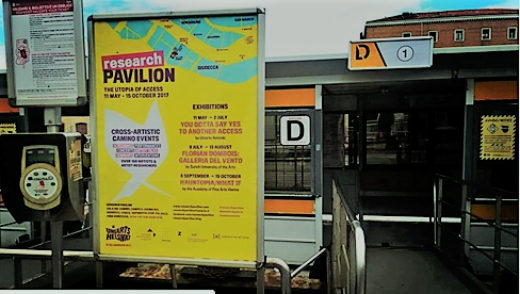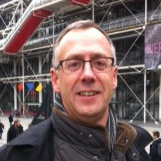
This summer has been taken up for me with a number of preparation activities. Preparation of funding grant agreements for an EU project (still needs new amendments), preparation of a public talk on the Future of Work and Contributory Economy (talk not finished but to be ready for next Friday the 25th), preparation of a book chapter on Digital Hermeneutics (still not finished), preparation of the schedule of seminars and speakers for the coming semester, preparing the final evaluations of the last semester, but the main one, the most complex one, has been the preparation and organisation of a Camino event in Venice at the end of September as part of the Research Pavilion (click here) during the 57th Venice Biennale.
The Research Pavilion came into being at the last Venice Biennale in 2015 and is supported through our colleagues at the University of the Arts Helsinki. The context for the development a specific Pavilion of artistic research has been the widespread development of Artistic Research as a mode of knowledge construction in the visual and performing arts within Higher Education across Europe. Artistic Research is sometimes referred to as practice based research, where the research takes place in and through the artistic practice, but I would argue it is not exclusive to this, the historical, philosophical contextualisation of the disclosure of practice is equally part of the research itself. Whilst the debate about what constitutes artistic research, and what makes a PhD in the visual and performing arts, has been ongoing for over 15 years, The Research Pavilion acts as a means of showcasing artistic research in the context a major international biennale.
Within the Art world the major biennales are taking place this summer, the most well known one to the general public is the Venice Biennale but the lesser known Documenta (14) is also taking place this summer in Kassel and Athens; some purists would argue that Documenta is where the real edgy stuff happens. There is, however, an inherent tension, which I am struggling with, between the very idea of separate pavilion for Artistic Research and the role of the biennale. The thematic chosen for this iteration of the Research Pavilion is the ‘Utopia of Access’, underlying the thinking behind this is the on the one hand a thematic of totality access which has been enabled by the development of digital technologies, we have access to everything 24/7 and on the other limitation of access (technologically driven or politically driven). The summer weeks have been, therefore, taken up with sorting out the administrative headaches of bringing three universities together in Venice - getting universities to pay each other seems to be special art form in itself. There has been a lot of sorting out to do in relation to the logistics of hosting an event in Venice during the biennale. Venice is a notoriously difficult place in terms of logistics, the very geographic complexity of the city is always a feature. Getting things there, usually involves shipping art works, and then getting from one island to another usually requires a boat or perhaps a bridge.
The Utopia of Access has been developed with my colleague Brian Fay and PhD researchers under the guises of the development of Big data and Data analytics and the development of new forms of political economy. In order to do this the research groupings within DIT/GradCAM (www.gradcam.ie) (The Enquiry Group and the Aesthetics Group) will be presenting their Artistic Research Activities as performances, Digital Installations alongside panel discussions. Dan Cameron who curated the Venice Biennale will participate in a panel discussion and the French Philosopher Bernard Stiegler, one of France’s leading philosophers of technology will give a presentation on his development of a contributive economy. These new modes of economy will be essential as automatisation of decision making processes will lead to massive loss of employment. Over the summer months there have been a number of meetings in relation to a specific technology platform that we are building with the help of SFI Adapt and ICE research Institute at the DIT. This platform will be used as part of the Enquiry Research Group and Visual Artist Jeanette Doyle’s work ‘Cf’ which is an autonomous biennale project, whereby anyone can choose to represent any country – for example a burnt out Fiat in a field in Romania could be the Italian Pavilion. This project, therefore, subtly undermines the whole process of the Venice Biennale whereby Artists are chosen within a reputational economy to represent their country usually at high costs. The digital platform will be used as a means of making present, during the Research Pavilion, works of Artists throughout the world. The means of choosing which artist is shown will be done through a specific algorithm – using completely randomised data such as the temperature in the country at the time of viewing aligned with the recorded GDP of the country over the last 5 years. The choice of data used to determine which art work is shown is used to also highlight the Utopia that Big Data represents, however, it also points to the limitations of its usage. Each decision made throughout the project has been met by the specific tension of limitation of access, limiting who can submit a project, this limitation was implicit in who gets to know that they can participate, limitation of what can be uploaded in terms of length or size of file, limitation about what can be shown in the Research Pavilion itself and; limitations on who gets to the see the art work – who can afford to be in Venice etc. The ‘Cf’ autonomous biennale project is only one part of the overall three day event which involves other forms of Artistic Research – performances, screenings, public talks and panel discussion.
All of this preparation leaves my ‘to do’ list getting longer and longer as the day job begins to loom closer on the horizon and the students begin to re-appear. It is busy this time of year but I suppose one can wonder when is it not busy.
Further details about the event can be found here.


